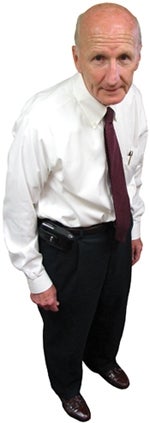On the morning of Edward McIntyre’s first day as a practicing attorney, his boss showed him the front page of the Boston Herald. On it was a story about a murder on Cape Cod. “This is your first case,” McIntyre recalled his new boss saying. But by then, the Clinton-based attorney was used to being thrown into the fire. He was drafted into the Army in 1968 and served in Vietnam between Sept. 1969 and Dec. 1970. McIntyre became president of the 15,000-member Massachusetts Bar Association Sept. 1. Here, he talks about how technology has changed the legal profession, his new responsibilities as MBA president and the group’s responsibility to the state’s veterans.
>>What was your first job after graduating from law school?
I went to work for a lawyer in Canton, Paul Schneiders. He was a mentor to me in my first 10 years of practice. I walked in after the Fourth of July holiday in 1982 and he unfolded the Herald and said, ‘This is your first case,’ and it was a murder case. A client had been charged with murder down on the Cape. Paul was a pilot and we were off that morning and flew down to the Cape and we spent a good portion of the summer and part of the fall working on that case.
>>How do you expect your day-to-day responsibilities to change with your appointment as president of the Massachusetts Bar Association?
It probably involves anywhere from three to four days a week in Boston. The Mass. Bar president has a great deal of interplay with all three branches of government.
>>What are some of the top issues that you’ll be bringing to the legislature?
At the legislature, we’ll continue to work on what we call the Veterans Initiative. Many returning veterans from Iraq and Afghanistan have legal issues that are not addressed by the Veterans Administration and we would hope to make the legislature more aware of these issues. For example, multiple deployments end up causing family friction and family break-up, custody issues, housing issues, employment issues. Our initiative was initially to address the petitions for veterans’ benefits, both state and federal. Once we got into it, it was like opening a Pandora’s Box.
>>How has the MBA changed in the last 25 years?
We’re having difficulty obtaining younger lawyers, and retaining them as members. I don’t know if it’s lifestyle, or if they just have other things to do at this point in their lives. When I got out of law school, it was the expectation that you would join and there’d be years where you probably wouldn’t be involved, but you’d be a member and eventually in your late 40s or 50s, you’d find yourself involved.
>>How has the legal profession changed since you became a lawyer?
The practice of law today is faster than I ever imagined it would be. Internet, attachments, e-mail… We exchange medical documents now by DVD, we exchange them electronically. More and more of my communication is through the Internet. You meet with clients now over the Internet. The expectation you have of clients now is that you’re going to be meeting with them instantaneously over a computer.
>>What is the greatest challenge facing the legal profession today?
A couple of things: The do-it-yourselfers. People who believe that they cannot afford a lawyer try to do it themselves. People today are better educated and better informed and think they can do it themselves. The other phenomenon is the outsourcing of legal work to India. That work used to go to contractors. You’d bring in a stringer, you’d bring in a contract lawyer.

